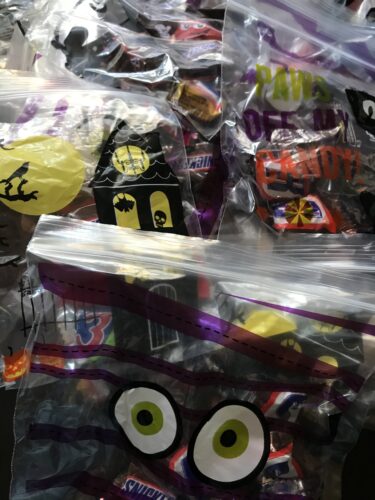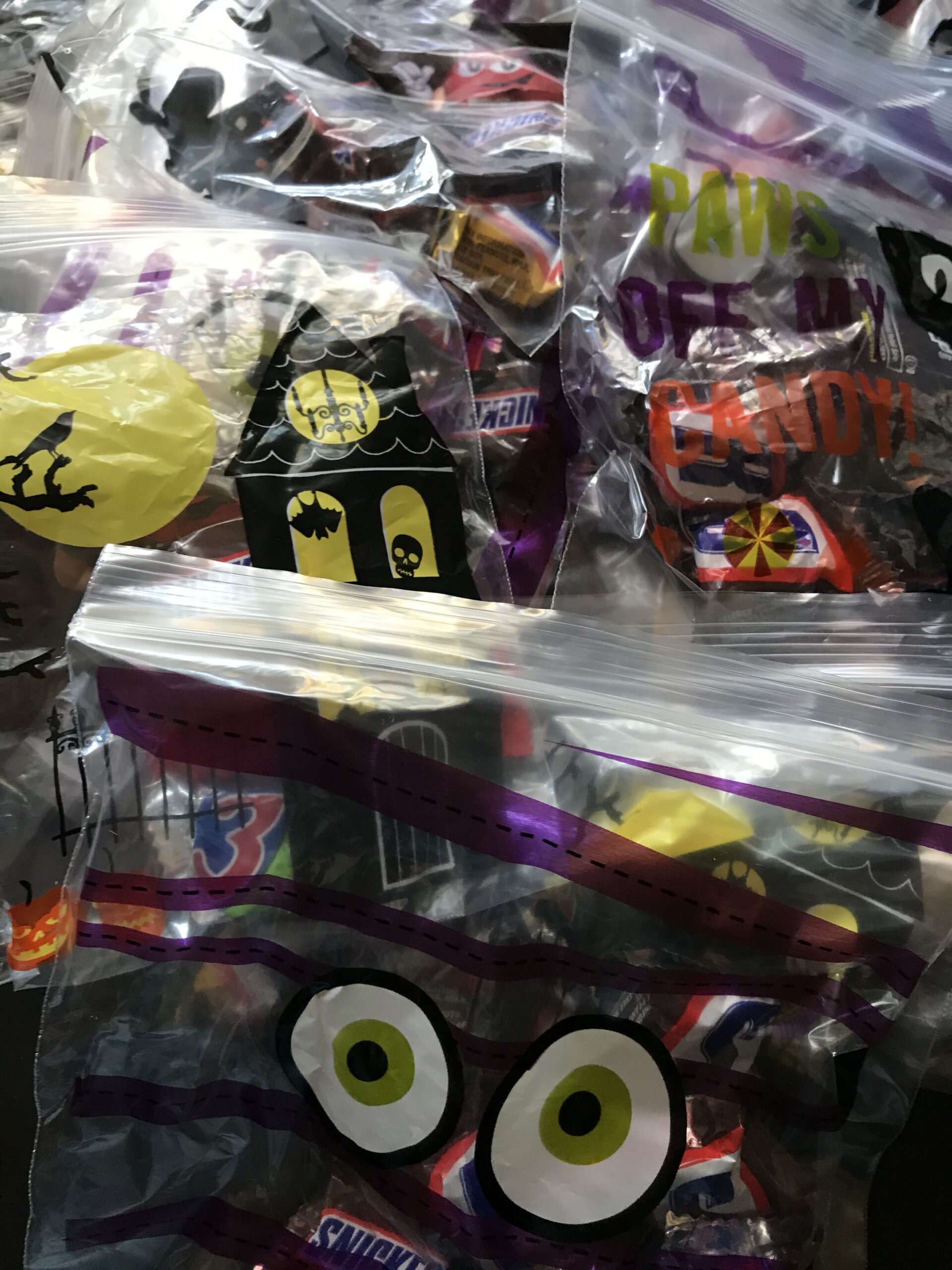
Image: Kelly McCarthy CC0
Halloween is the perfect holiday for children to discover the humanity of trade. Trick-or-treating may be the main attraction, but the spontaneous candy swap negotiations that occur afterwards are often just as enjoyable and help children learn important economic principles.
Fortunately, my community was not one of those to ban trick-or-treating last year. While Halloween was more subdued than usual, my children returned home from trick-or-treating with a large bounty to trade among themselves and with neighborhood friends. It’s fascinating to watch the emergence of these fun-size markets and of the kids’ enthusiasm for commerce.
Here are 5 key economic lessons kids learn on Halloween:
1. Trade Is Voluntary
Once upon a time, “trick or treat” was quite literal. The kids demanded the “treat” under threat of “trick” (some sort of mischief), although it was all in good fun. But now, Halloween is a strictly voluntary affair. Neighbors decide if the enjoyment they get seeing kids in costume is worth the time and money spent on giving out candy.
This year, perhaps more than ever before, trick-or-treaters saw how voluntary this arrangement is, as many neighbors decided not to participate in Halloween due to the pandemic. The kids skipped over their darkened houses, visiting only those that were openly inviting.
Some homes seemed more generous than usual, delighted to have at least one symbol of normalcy in an otherwise turbulent year. As one Twitter user noted: “I bought more candy than I usually do. Any kids who show up at our house are getting handfuls of candy this year.”
After trick-or-treating, the voluntary nature of trade is even more apparent. My kids spent hours (and counting!) conducting candy trades with their siblings and friends. Trade occurs through negotiation and persuasion, not coercion, as kids decide what to give and gain. If a trick-or-treater can’t be convinced to give up her full-size Hershey bar in exchange for three Kit-Kats, the trade doesn’t happen. This process also emphasizes the important role of property rights in the marketplace. If the Kit-Kat kid tries to grab that Hershey bar from the owner’s stash, she is roundly scolded.
2. Trade Is Win/Win
Trick-or-treaters quickly realize that trading their candy makes everyone involved better off. It’s win/win. Let’s say the girl with the full-size Hershey bar decides to trade her bar with her brother for five Twix bars. That trade only happens if she values his five Twix bars more than the Hershey bar, and if he values the Hershey over the Twix. After the trade, each trick-or-treater is better off. Similarly, if I buy a cup of coffee for two dollars, I value getting that cup of coffee more than the two dollars, while the coffee shop values getting my two dollars more than giving up its coffee. We, too, are both better off as a result of this trade.
3. The Wider the Trade the Better
If my four children only traded their Halloween candy with each other, they would still be better off but not nearly as much as they would be if they expanded their trading circle to their neighborhood friends. Opening up trade to more participants broadens the variety, quality, and amount of possible exchanges. Restricting trade to within our borders limits our personal and collective gains. This explains why we are all better off with global free trade than with trade restrictions and tariffs that reduce market cooperation and can lead to economic stagnation.
4. Value Is Subjective
Halloween very clearly reveals diverse human preferences. Some trick-or-treaters prefer Snickers over Twizzlers, while others want M&Ms over Mars Bars. Some kids will trade for additional M&Ms because they prefer M&Ms over other items, while other kids will keep trading for additional Mars Bars. The value of things we trade for is subjective. It does not reflect any inherent value of a particular item, but rather the value we ascribe to that item. As Max Borders writes:
“Subjective value can be a tough idea for some people to grasp. It can be even harder for people to accept. But here’s the hard truth: Value does not inhere in things. Sunsets are not inherently beautiful. Vanilla ice cream is not inherently tasty. Jazz is not universally loved. Prices are objective—that is, publicly observable. We can each walk into a store and see that the avocado is $1.50. But our inner states will determine whether the fatty fruit winds up in any of our baskets.”
Our kids recognize subjective valuation in their candy trades. A Snickers bar doesn’t have an intrinsic worth; its value is personal to each trick-or-treater and reflected in what he or she is willing to give up to get it.

Join us in preserving the principles of economic freedom and individual liberty for the rising generationSupport FEE’s Mission
5. Value Is “Marginal”
As my kids continued their trading, some items lost value while others gained value. For example, when my six-year-old had plenty of Twizzlers, the value to him of an additional Twizzler was low while the value of attaining another unit of the scarce, full-size Hershey bars was quite high. He was willing to trade a lot of his candy for one additional Hershey. This reflects a great discovery in economics: the solution of the water-diamond paradox.
Some early economists had trouble with the idea that value is subjective: that the value of a good depends on how useful the individual regards it.
“If that were true,” they objected, “then water would be more valuable than diamonds, since everyone gets more use out of water than diamonds.”
Since value could not be based on subjective usefulness (utility), they tried to base it on something else. Some argued for labor. “Diamonds,” they claimed, “are more valuable than water, because it takes more work to dig them out of the ground.”
Later, Karl Marx would seize on this “labor theory of value” to argue that only workers, and not capitalists, produced wealth.
But then a solution to this paradox was thought up by three different economists around the same time, including Carl Menger, the founder of the Austrian school of economics.
He pointed out that the usefulness of any given unit of a good depends on how much there is of it.
What is more useful: a gallon of water or a diamond? Well, it depends. If you’re stranded in the desert, a gallon of water means the difference between life and death by thirst, while a diamond may just be pretty to look at. But then if you stumble upon an oasis with a spring, that changes things. The total usefulness of water is still high, because you still depend on it for survival. But the usefulness of any additional unit of water (the “marginal utility”) is much lower, maybe even negligible. In that case the diamond’s bling might matter more.
This is why my 6-year-old’s Twizzler exchange rates rose and fell depending on how many he already had in his little hands.
A Wall Street Journal review of Janek Wasserman’s book, The Marginal Revolutionaries: How Austrian Economists Fought the War of Ideas, explains what set early Austrian School economists apart from their peers and why this economic theory remains important and relevant for today’s challenges:
“Menger challenged the then-orthodox ‘labor theory of value’ that Karl Marx had turned into the war cry ‘workers of the world unite.’ In its place Menger introduced the concept of ‘marginal utility,’ which in oversimplified terms means that the only accurate way to measure the true value of goods, and thus achieve an efficient allocation of resources, is through an arrangement that allows the buyer to signal what he is willing to pay to satisfy his needs or desires—in short, what the market will bear. Setting prices by state edicts begs for trouble. Menger’s ideas, over time, were elaborated into a broad theory of the economy and society, so that the Austrian School came to signify a defense of individual liberty and an indictment of statism and central planning.”
With the exception of this year’s government trick-or-treating bans, statism is typically minimized on Halloween and decentralized, voluntary exchange wins over central planning (unless parents interfere!). Kids’ individual preferences guide their trades, and they find themselves better off after these exchanges than they were when they first returned home with their bags of candy. On Halloween, children learn enduring lessons about free-market economics and why human cooperation beats coercion.
Kerry McDonald is a Senior Education Fellow at FEE and author of Unschooled: Raising Curious, Well-Educated Children Outside the Conventional Classroom (Chicago Review Press, 2019). She is also an adjunct scholar at The Cato Institute and a regular Forbes contributor. Kerry has a B.A. in economics from Bowdoin College and an M.Ed. in education policy from Harvard University. She lives in Cambridge, Massachusetts with her husband and four children. You can sign up for her weekly newsletter on parenting and education here.
This article was originally published on FEE.org. Read the original article.

